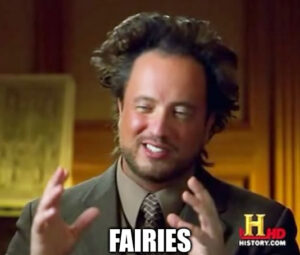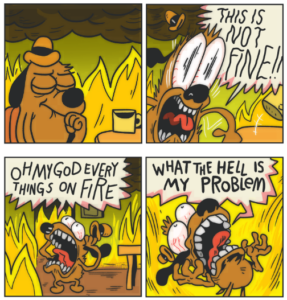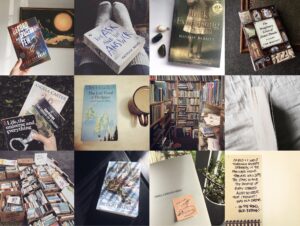Stop Giving the Baby to Rumplestiltskin: Artificial Intelligence and the Arts
An opinion piece, complete with references and memes
It’s inescapable, isn’t it?
You don’t even have to be on the internet to see it around anymore. Signs of ‘Artificial Intelligence’ are everywhere around us these days, leaking off our screens and into ‘meatspace’. My spouse saw that a small chain restaurant near his work had generated AI art for an advertisement. Boom, one loyal customer lost. If he and I can dig into our pockets to pay our artist friends for custom work, then a bloody company can do the same, thank you very much.
But the digital world still has it worse. It’s all over social media, fooling people into believing what they already wanted to believe, spreading false information (1), and in some cases, endangering lives (2).
I have a particular concern I want to dig deeper into. What does the current AI zeitgeist signal for writers like me?
-

Fair warning, this opinion piece is going to get a little intense. Image source: It’s Always Sunny in Philadelphia (2008)
AI: A PRIMER
At this point it’s important to make sure you and I are on the same page, dear reader. If you feel you know this stuff already, then please skip to the next section.
You will have no doubt heard of AI lately (if not, who are you and how can I live your blissful existence?). But depending on your exposure to it, you might not understand exactly what it is, or how it is different from the smart machines already around you. When you hear AI these days, we are talking about something called a Large Language Model. It is very much not the same thing that powers your robot vacuum, or your smart TV, or your phone’s predictive text, no matter how clever those things might appear. Those are run by discreet programs, powered by a lot of statements behind the scenes which run along the lines of “If this, then that”. Your predictive text works like that: say you’ve typed in ‘see you’ so far into the text, the program is able to assess fairly accurately that IF user types ‘see you’, THEN ‘tomorrow’ is a likely word to follow, or ‘later’, or perhaps ‘next’. Choosing ‘next’ starts the pattern all over again. IF ‘see you next’, THEN ‘month’ or ‘week’ could be good options to offer you. The program learns your preferences over time and bumps them up in probability, placing them in the centre more often.
But what your phone’s not doing, is drawing from the deep sea of all of recorded literature and media. Large Language Models, by comparison, are doing something akin to that. The companies behind these LLMs have strip-mined the internet for content, be it public domain works, illicit copies of major works still under copyright, or small-time creators posting their work on social media to get a tiny bit of sunshine in our attention ecosystem. These companies have completely ignored copyright (though don’t get me started on how problematic that is as a concept!). The models are agnostic, without judgement, dredging the internet for anything and everything, regardless of quality or appropriateness of content. The anti-piracy industry makes a big stink about individuals stealing digital copies of media they enjoy. But when it comes to this wholesale pillaging? World governments are just standing by wringing their hands. Oh me, oh my, whatever are we little old govts going to do against almighty capital?
But if that weren’t bad enough, you need to take into account the huge computing power going into every single transaction. In order to come up with these magical ‘artificially intelligent’ answers – be they so-called facts, fiction, generated artwork – the LLM has to go through everything it has on record, drawing on what might be relevant, and whittling it down according to a series of metrics. The result it spits out may be what you were looking for, or it may be so wildly off the mark that you might as well have done the work yourself.
And the cost for all of this? To quote James Vincent at The Verge, “Training a large language model like GPT-3, for example, is estimated to use just under 1,300 megawatt hours (MWh) of electricity; about as much power as consumed annually by 130 US homes” (3).
Why, I ask you, is this allowed to happen, in a world where climate change is very real? When multiple Pacific nations are facing being swallowed up by a Tangaroa who is swelling with his host of modern human-made ailments… what the hell is wrong with us?
One last note before I move on from this section, for anyone who’s still confused: AI is not a sentient machine being. I would love to have an android friend like Star Trek’s Data. The possibilities of exploring the meaning of life side by side with sentient beings created by humans is such a wild and mind-blowing idea if you actually stop and think about it. It’s so popular in fiction that it’s practically blasé. But no. That would be amazing, if it were real.
That is not what is happening though. No matter how much an AI chatbot might try to convince you otherwise. (4)
AI: A THIEF IN THE NIGHT
By now, you most likely are aware of the multiple accusations thrown at AI, of it stealing and repurposing original work as reconstituted slurry.
Visual artists have of course been heavily hit by this thievery. In an industry already plagued by instability for workers, artists now have to contend with AI provably stealing their work and remixing it with no originality, no acknowledgement, and certainly no payment (5).
LLM datasets for text-generating AI tools were found to be trained on copyrighted textual works, causing many famous authors to sign a petition against their use (6).
AI-generated books have been published on Amazon under the names of existing authors to poach some of those authors’ credibility (7).
It’s hit the music industry too, because of course it has (8).
Elon Musk has told everyone that the artist formerly known as Twitter will now be scraping every tweet (sorry, post) for LLM training, causing another wave of X-odus (9).
But it’s not just the arts industries that need to be worried.
In my day-job industry (yes, I work in tech…), Microsoft’s Co-Pilot has been found exposing proprietary code from some companies who use the tool (10). Wild. I mean, if the cogs of capitalism want to devour each other like some endless spiral ouroborus, have at it. But less obvious a flaw of Co-Pilot; a number of my developer friends have confided in me that it’s been a complete waste of time. This software that their management wants them to use to make their lives more efficient is taking as much time as normal, except this time the devs aren’t writing great code from scratch. Instead they’re going in afterwards and correcting incorrect code hallucinated by Co-Pilot.
To paint a picture: Imagine if you got to be a wizard who wrote the world. You make a few commands, and suddenly there is something that exists, and it works as you designed it, as if by magic. You’d probably feel a decent amount of job satisfaction in that, I’m sure.
Now imagine that you had been that wizard, and then your wizard bosses tell you you’re now to spend the rest of your life correcting an idiot child’s magic words instead of writing your own.
I’d be pretty aggrieved about it, personally!
A lot of people fall for techno-babble bullshit because it sounds impressive. But are tech people as naive as the rest of us? No duh. One just has to take a look at the blatant stupidity and ineptitude of one of the world’s richest men to understand that… oh, right. Money does not actually equal intelligence.
But the hype these Silicon Valley types are generating is seductive, promising a world of futuristic ease. It’s a trick. What are we actually getting instead?
A WRITER’S CONCERN
What we are getting is the joy being sucked out of the act of iteration, improvement, and creation itself.
I used the example of my developer friends before. Those concerns translate to writers and other artists quite easily. We are wizards too, creating characters and whole worlds, reviewing what we have done, iterating and testing it out, until we are happy that it meets the goal we had in mind. (Why yes, software development and art do have a lot in common! People are often surprised to hear this, but it is true.)
I remember when I was a younger writer, I used to think writing came from a divine source, and that whatever I put on that page in the first draft was as it was meant to be, channeled straight from the muses. Until I learned the power of revising, if people didn’t like my first attempts, I just gave up. But it strikes me now, that’s what the AI folks think art is. They think you feed an idea straight into the machine in the form of a prompt, and it all comes out at once, a finished product. I dread to think what would pop out if I fed my first pre-writing plan of one of my books through a LLM. You see, while I’m writing, I get to take a lot of paths off to the side. What I write might change depending on my mood, what happened to me in the morning, what I watched on TV last night, what I’m reading right now, conversations I’m having in person or online, all of this taking place over two or three months of drafting a novel… but a LLM doesn’t get all of that. It can only see the finished product of fiction writers, and shallowly pick and choose the surface layer of the text in an instant.
Theme? Subtext? Who dat?
Also how is it acceptable or even desirable to mash all authors in the world together in a mechanical melting pot, then pump out a slurry of our words and call that fiction? What I write might be different from another writer, even with the same prompt. They will have had different experiences than me: a different upbringing, traumas, preferences, desires. But I want to know them. Either I will be delighted by a point of difference between us, a way I never thought of seeing something… or I could find a similarity, a kinship across time and space. A machine cannot give me that.
Not yet, anyway. (Oh man. When actual synthetic sentient beings are made, we’re going to have to fight to emancipate them from their corporate overlords, aren’t we? What a miserable thought.)
What other concerns have we got, as a class of labouring people – because that is what we are, folks! We have already weathered many different storms along the intersections of writing and technology. People used to be worried about e-books, only to find that readers are still keen for the physical page. Not only that, but the ease with which ebooks can be created means that repositories are replete with cash-grab trash even before AI came along to complicate things. But in response, there grew up an ecosystem of reader-reviewers. Solutions pop up whenever new problems arise. This is nothing new, that’s just humanity.
But the new problems grow. Almost every short fiction journal online will have some statement somewhere about not wanting AI submissions, after places like sci-fi and fantasy online journal Clarkesworld got inundated with AI drivel, causing them to close their open submissions entirely (11).
Speaking of stalwarts, NaNoWriMo, formerly the place to be as a writer every November, imploded, and broke containment out of writing news circles into mainstream news, when they made a rather ignorant statement supporting AI use for writers, especially if they were disabled or poor (12). Writers feel very strongly about this issue, which makes me take heart.
But in bad news, a bunch of publishers have responded to the looting of their writers’ books not by suing the pants off the tech houses responsible, but by asking their authors to sign away their rights for LLMs to train on their works (13). No thanks!
All this thievery, in the name of what? Because, when it comes to writing, what is AI actually producing, en masse? Not emotional masterpieces of grand sweeping creative writing, let’s be real. It is mass producing lame copy and fake news which actually endangers lives, as I mentioned before. It is hallucinating answers to things which used to be easily searchable. It is muddying the waters. It is LYING.
You know what else lies? Fairies.
-

Image source: Ancient Aliens (2009), text caption author’s own.
All right, so I might sound a little off-base right now. Fairies, really? But hear me out.
It has been used to trick parents into thinking their kids are in jail, to steal money by stealing their voices (14). Tricksy little fairies.
It has been used to create deepfakes (15). Copycats, doppelgangers, changeling little fairies.
It seduces with illusions of a perfect world, or one that aligns perfectly with your worldview (16). Illusory, false-promising little fairies.
Put a pin in that. I’m not done ranting about faeries yet.
A MĀORI WRITER’S CONCERN
Of course, we’re familiar with all this, aren’t we? The stealing of our taonga, in this case our words, our intellectual property, to fuel capitalist expansion? Hello, colonisation, cosplaying as technological revolution.
-

Visual Source: Scooby Doo, Where Are You! (1969). Text caption, author’s own.
And of course, we are familiar with certain other aspects of the problem. A major complaint about AI which has come to light is that it is all too easy to find it churning out the racism, sexism, and all the other multifarious bigotries of the internet which it has scraped up as training data (17). This is unsurprising to many who have experienced institutional biases. Of course data can be biased. A machine trained on such data literally cannot help itself.
Though for me, there’s a little glimmer of hope in that fact. The biases of these machines are a huge weakness, one which many of the people working on them have a blindspot about, to the point where they can’t even conceive of what I’m going to say, or don’t believe it matters in any way at all. More on that later.
An additional hope arises for me out of Wai 262. We recognise the preciousness of our creative and intellectual taonga. If only more people could see art in that way. This is one of those many cases where adopting a more Māori way of seeing things will benefit everyone, not just Māori. Imagine a world where we see everyone’s artistic contributions as inherently existing in a protected state. That may seem far-fetched to our eyes now, steeped in the exploitability of our current capitalist paradigm. But I always come back to Ursula Le Guin on this one: “We live in capitalism. Its power seems inescapable. So did the divine right of kings. Any human power can be resisted and changed by human beings. Resistance and change often begin in art, and very often in our art, the art of words.”
So it’s through these thoughts that I find a tiny sliver of hope for Māori writers. I hope by extension, others might be able to come and get warm under our korowai in time. We have always stood up to things being taken from us.
If only our word rorohiko were more accurate. Or perhaps it isn’t so off-the-mark: it’s not like we’re calling it a whole person, after all. Just a thinking organ. Perhaps that means we won’t be so easily fooled as others? But we are only human, after all. And I’m a bit more forgiving to people who are just trying to eke out a little something special for themselves at this point in late-stage capitalism.
Using the tools of the oppressors in that case, even if you know you shouldn’t, I think is just part of one’s journey. Certainly I played around with AI a couple of years ago, hoping that having a generated book cover for my draft work might inspire me to succeed. But it never quite met the mark. And having paid artists for their work before that and since, I know that process is far more rewarding. It’s real. Obviously.
He tangata. Who would have thought?
I’M FINE WITH BEING CALLED A LUDDITE
But can’t AI help us? Sure. There are definitely initiatives which are leading to amazing, life-changing results. That same technology capable of stealing people’s voices to scam elderly parents is being used to return people’s voices in cases where they have lost the ability to speak or sing (18). Other uses aren’t so life changing, but immensely entertaining, such as the YouTube channel ‘There I Ruined It’. The creator of that channel uses AI voice technology to make it sound like Johnny Cash is singing Barbie Girl (19), or The Beach Boys are singing 99 Problems by Jay-Z (20).
The important thing to realise, however, is that the creator behind the channel is using AI as a tool to elevate his parodies. Here’s a video proving that he’s got the musical skills to create the pieces which AI then modifies (21). The majority of his work is done not with AI, but music recording and mastering software. Tools, used by a man’s hands. Go to most other ‘AI music’ channels on YouTube and you’ll find a bunch of bland drivel that is too odd and flat to be interesting or funny.
Most people using these tools to ‘create art’ are not doing that level of custom work. The corporations aren’t helping people to make bespoke tools. Instead they release mass market tools which allow ‘art’ to ‘be created’ at the click of a button. It’s clever folks like ‘There I Ruined It’, people with the actual crossover skills between arts and tech, who are creating AI tools which can be used in specific circumstances to make their art unforgettable.
Don’t get me wrong. I’m a sci-fi nerd. I want there to be intelligent and helpful computers. But we need an Earth beneath our feet in order to live to enjoy things like that. You know, one where the weather doesn’t start trying to kill us? Mars isn’t happening in my lifetime (you listening, Elon???).
I don’t want this is article to be part of a finger-pointing moral panic. Technology can be good. But I’m done caving to the reasonable, the compromise. Because you know who isn’t compromising? The tech guys certainly aren’t. Nor are political figures who would see us crushed in other ways, both overseas and here at home. I am done being the reasonable one here and sacrificing the things we know to be good and true in the name of being ‘adults’. We raise children on fairytales where we warn them not to hand over parts of ourselves to trickster fairies. So when did we be become stupid and start selling our souls in order to avoid this conflict? We are crustaceans being boiled alive.
People who communicate by memes (i.e. me) might think of this picture right now.
-

Image Source: Gunshow by KC Green
But what many people who share that picture fail to realise, is that the author and illustrator of the picture got upset with people misusing his work, and using it to justify a doomer attitude. He issued a sequel to it years later.
-

Image Source: https://thenib.com/this-is-not-fine/
Hard same, little dog-man.
So no. I’m putting my foot down. I don’t care if any agents or publishers tell me I’m being naive for not seeing the profit in allowing models to train on my work. There were normal people who once said, let’s just go ahead with the fashion of the times, not stick our heads up to say this is wrong. There’s a whole famous quote about that (22).
I’m not having it anymore. I’m calling on that purākau of my Pākehā side to say: let’s stop handing that fairy Rumplestiltskin our firstborns! We know he’s not a good guy! Say his name, and stop making deals with him. He only has power so long as we collectively decide he does.
AI AND YOU
So where am I landing on this? What’s the lowdown, when half the people you hear out there are saying it’s inevitable, and the other half are saying this is not it? As both a writer, and a worker in the tech industry, I fall firmly on the this-is-not-it side.
From my tech side, I implore you to read this blog (23). Here is a super technical person describing why AI is not going to work, in a delightfully colourful manner.
If you need financial proof, here’s this (24).
If you yourself are a writer, reading this, I want you to take heart. This is where I call back to that pin I left up there before: AI is not good at individuating voices, and that’s for several reasons. It can’t do non-mainstream narrative voices. It squashes everything down to a flat paste, losing all difference in experience. When it is asked to write something which stirs the emotions, it is saccharine and stereotypical. Do not fool yourself into thinking it is better than your writing can be, or will be.
I know what I want as a reader, and I ask it of you as a good faith transaction, not a demand from a trickster fairy. As much as I am bringing me to the page as a reader, I want to read YOU behind the words. Most readers want to read you behind the words, not the emptiness of a machine. We know this to be true, and we’ve known it for a long time. No one wants to read a copy of someone else, which is why all of us writers are always pushing towards that elusive ‘voice’.
But at least we have one. AI, or at least the current iteration of AI based on LLMs, will never ever, ever, ever ever times infinity, ever have a voice.
Let’s get even more specific on this. Maybe you want some tips for navigating this new peril we find ourselves surrounded by. Here’s a collection of advice from yours truly:
- If you can avoid using AI at all, avoid it as an ethical standpoint, if for no other reason. It is destroying the environment, informational trust, and people’s jobs.
- Do not willingly contribute to the training of these models if you can avoid it. Remember you are being used. Exercise your rights as a human being to not be a cog in their machine.
- As a writer or any type of creative, do not use mass-market models to generate ideas. Your fellow humans exist to help with this, on social media, or writing groups, or on blogs full of prompts e.g. (25).
- If you must use it, or find you are being used, demand compensation.
- Being forced to use it for work? Don’t get too upset about it if you’re on the lowest rung. We all need a paycheck to live. I’m not blaming you. But if you can, lodge your complaint about its use. Also, if you can figure out how to do it, practice malicious compliance e.g. if you are forced to use it, use it for everything: feedback, goals, reports, banal email responses. Use it to highlight its weaknesses.
- Support people who are fighting to develop and use AI ethically and sustainably.
I’m sure there will be more to add to this list in the future, especially by people who know more than me who can contribute to this conversation.
IN CONCLUSION
I’m not going to sugarcoat it. AI is going to be a formidable foe for writers in the coming years. I firmly believe it will never write anything of actual worth. But that won’t stop it flooding the self-publishing marketplaces, nor will the inevitable compromises of lazy mainstream presses stop, as they cave into the drivel.
But the thing is, all those struggles were already there. It already is so hard to get published in the first place. The self-pub places are already stuffed to the bilges with half-baked garbage. Mainstream publishers are often averse to punting on newcomers and taking risks. That’s why, more than ever, initiatives by writers, trusts, publishers, and literary bodies in general must continue to foster excellence in writing, and greater engagement with readers, to cut through our noisy neighbours over in the tech grifter house.
In other words, Ngā Mihi Nui to Māori Literature Trust and Huia Publishers!
I will end with that whakatauākī we all know and love. Every time I get heated up about a situation, it almost always comes down to people forgetting or ignoring this most important of messages. But so long as we keep it foremost in our minds, it will guide us in the right direction.
‘He aha te mea nui o te ao? He tangata he tangata he tangata!’ – Meri Ngāroto, Te Aupōuri
P.S. Speaking of the people being so important, I also want to mihi to Steph, Taryn and Toni for encouraging me to write this article, and giving me a few choice ideas for where to go with it. I am so excited that we’re all going through Te Papa Tupu together. It is an absolute privilege to be sharing this journey with you.
Sources:
- https://archive.ph/LIwWc
- https://www.forbes.com/sites/mattnovak/2023/08/12/supermarket-ai-gives-horrifying-recipes-for-poison-sandwiches-and-deadly-chlorine-gas/
- https://www.theverge.com/24066646/ai-electricity-energy-watts-generative-consumption
- https://www.scientificamerican.com/article/google-engineer-claims-ai-chatbot-is-sentient-why-that-matters/
- https://www.levelup.com/en/news/715571/Artist-shows-evidence-that-AI-is-possibly-stealing-others-art#
- https://www.npr.org/2023/07/17/1187523435/thousands-of-authors-urge-ai-companies-to-stop-using-work-without-permission
- https://www.npr.org/2024/03/16/1238983175/authors-push-back-on-the-growing-number-of-ai-scam-books-on-amazon#
- https://pitchfork.com/news/music-industry-groups-sue-ai-companies-for-stealing-artists-work-to-generate-music/
- https://80.lv/articles/twitter-x-will-use-your-posts-for-ai-training-and-there-s-no-opting-out/
- https://blog.gitguardian.com/yes-github-copilot-can-leak-secrets/
- https://www.npr.org/2023/02/24/1159286436/ai-chatbot-chatgpt-magazine-clarkesworld-artificial-intelligence#
- https://www.wired.com/story/nanowrimo-organizers-classist-and-ableist-to-condemn-ai/
- https://authorsguild.org/news/harpercollins-ai-licensing-deal/#
- https://www.newyorker.com/science/annals-of-artificial-intelligence/the-terrifying-ai-scam-that-uses-your-loved-ones-voice
- https://sites.bu.edu/dome/2023/08/10/revenge-porn-and-deep-fake-technology-the-latest-iteration-of-online-abuse/
- https://www.scientificamerican.com/article/humans-absorb-bias-from-ai-and-keep-it-after-they-stop-using-the-algorithm/
- https://www.media.mit.edu/articles/artificial-intelligence-has-a-problem-with-gender-and-racial-bias-here-s-how-to-solve-it/
- https://www.npr.org/2024/07/25/nx-s1-5051720/jennifer-wexton-ai-speech-progressive-supranuclear-palsy
- https://www.youtube.com/watch?v=MAFdzBTe2lg&pp=ygUddGhlcmUgaSBydWluZWQgaXQgYmFyYmllIGdpcmw%3D
- https://www.youtube.com/watch?v=Z5EGZ145K_w&pp=ygUcdGhlcmUgaSBydWluZWQgaXQgYmVhY2ggYm95cw%3D%3D
- https://www.youtube.com/shorts/D8Wl0ioXlc8
- https://en.wikipedia.org/wiki/First_they_came_…
- https://ludic.mataroa.blog/blog/i-will-fucking-piledrive-you-if-you-mention-ai-again/
- https://mashable.com/article/ai-stock-bubble-burst?test_uuid=01iI2GpryXngy77uIpA3Y4B&test_variant=b
- https://blog.reedsy.com/creative-writing-prompts/
Further reading:
https://www.technologyreview.com/2022/04/19/1049592/artificial-intelligence-colonialism/
https://github.com/daviddao/awful-ai
https://www.youtube.com/watch?v=D8xL3ol3xw8
https://www.youtube.com/watch?v=UEMT0w835RE
https://libguides.wintec.ac.nz/ai-literacy-toolbox/data-sovereignty




